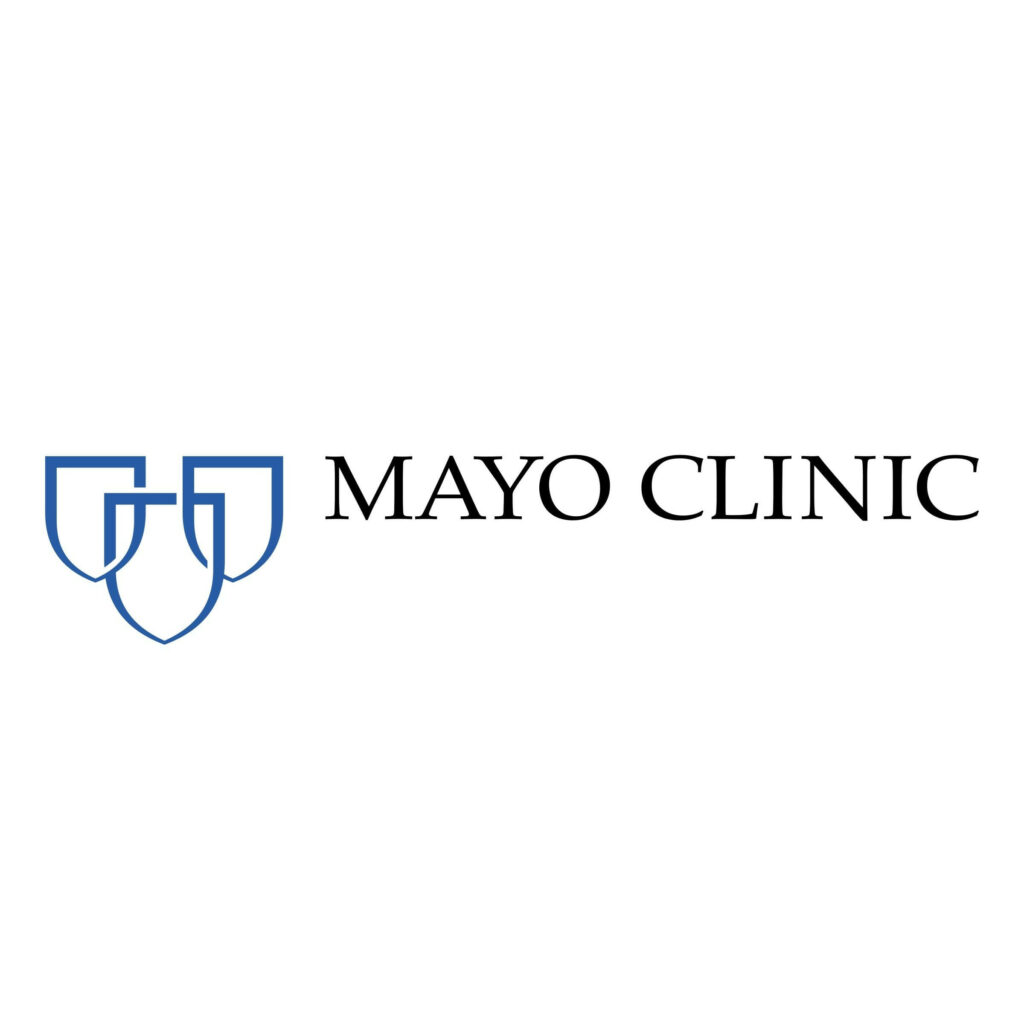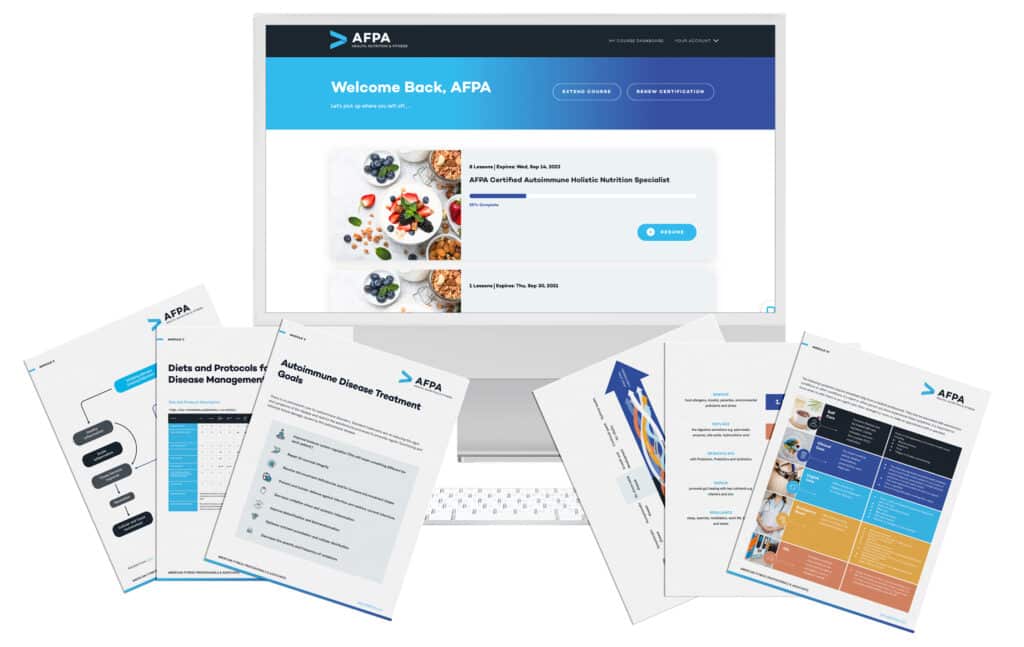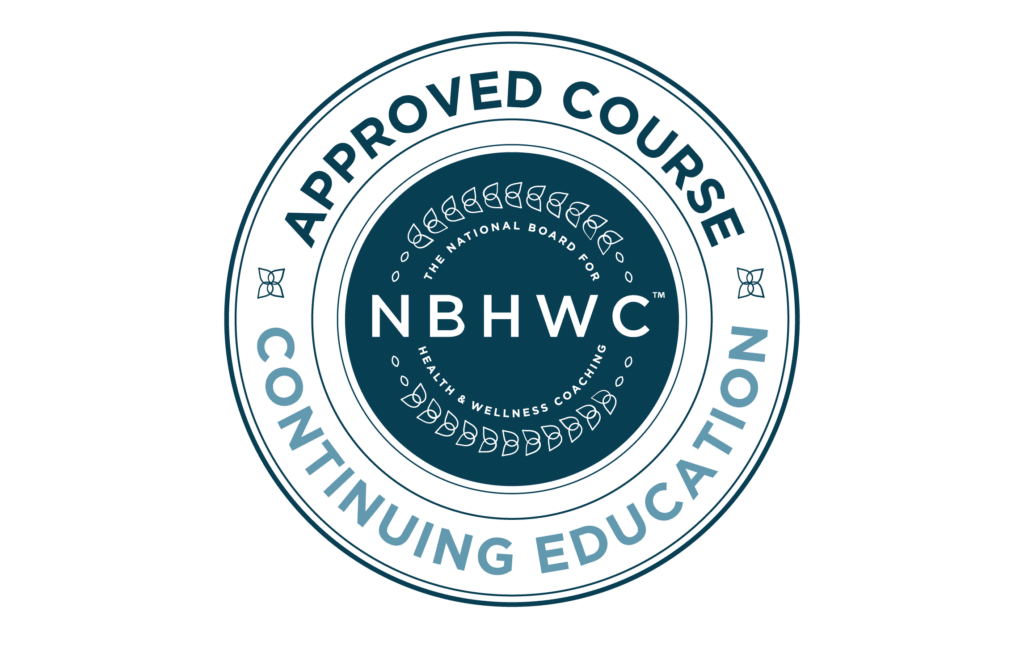Become an expert in helping people living with an autoimmune disease feel better.
As an AFPA Certified Autoimmune Holistic Nutrition Specialist, you’ll be able to effectively:

Understand the individual and systemic factors of autoimmunity and the challenges faced by clients with autoimmunity.

Explore which dietary protocols, and holistic strategies and approaches are applicable for various autoimmune diseases.

Identify how the most common autoimmune disorders affect various bodily systems and how to promote optimal health.

Apply your understanding of the immune system and autoimmunity to develop empathetic and supportive plans for your clients.
100% Online Learning
Complete in Less Than 6 Months
Self-Paced Curriculum
Industry-Leading Program
The most successful AFPA certified graduates are passionate and dedicated people who have been affected by chronic and autoimmune diseases themselves, or they know someone else who has complex health challenges.
Equip yourself with the most current and evidence-based knowledge to maximize the impact you have on your clients who have or are at-risk for developing an autoimmune disease.

Coach your clients to create lasting changes that positively impact their overall health status and well-being.

Learn what to prioritize for each client depending on their bioindividuality, history, story, and disease state.

Use various charts, illustrations, graphics, and handouts to educate your clients and refresh your knowledge.

Understand how different micronutrients, macronutrients, herbs, and ingredients that can impact the immune system.

Learn and progress through the course at your own pace within a secure, easy-to-use and modern online learning portal.

Earn an industry-leading and brand new credential that highlights your specialized knowledge, skills, and abilities.
Why get the Certified Autoimmune Holistic Nutrition Specialist Certification?


Support clients in transforming their health
Getting certified provides more access for people with autoimmune disease to professionals dedicated to helping them live their best lives. You can help your clients reach their nutrition goals and progress towards their ideal lifestyle through strategies and approaches backed by science.

Niche and specialize your business
Steer your professional career the way you want it to go. Thanks to the diverse opportunities that come with this new certification, you have the freedom to select the hours you work, set your own rates, create your own packages, and choose the work environment that’s right for you.

Acquire the most up-to-date, scientifically-backed information
Becoming AFPA certified gives you access to our continuously updated programs and insight from trusted professionals and holistic and integrative health leaders. AFPA is an industry pioneer in the health and wellness education space, having over 30+ years of certifying over 130,000+ students across 140+ countries

Easily afford your education
AFPA offers interest-free payment plans without credit checks to help you fund your education.
This program includes coursework and content that is curated and developed by a team of experts in functional medicine, personalized nutrition, and autoimmune integrative health. Over 350+ articles and research studies were reviewed, including published research from top universities.





AFPA and its courses are not affiliated with or endorsed by any of the universities or colleges displayed above.
Help your clients with autoimmune disease by becoming a Certified Autoimmune Holistic Nutrition Specialist.
A Look Inside The Curriculum
Prerequisites Answer
To become an AFPA Certified Autoimmune Holistic Nutrition Specialist, it is recommended (but not required) that you hold at least one current certification in a health, wellness, nutrition, or fitness discipline (nutrition, wellness or health coaching, personal training, or similar) or have at least an undergraduate degree in a health or science related discipline. We also recommend that you have knowledge of health and wellness coaching strategies and practices.
Module 1: Introduction & Welcome Answer
Learn the latest statistics about autoimmune diseases and the challenges patients with autoimmune diseases often encounter. This module will show you how you can help patients in their journey to a nutrition-based lifestyle, alongside the advantages and opportunities that come with earning your certification.
Module 2: Fundamentals of Immune Function Answer
This module focuses on understanding the role and parts of the immune system and how they function in the human body. Lessons include learning about the essentials of immune function, the factors that affect it, and understanding what autoimmunity is and how it happens.
Module 3: Causes of Autoimmunity Answer
Lessons in this module will tackle the different factors of autoimmunity, ranging from lifestyle to genetics, and learning how these factors influence a person’s susceptibility to autoimmune diseases.
Module 4: Basics of Autoimmune Disease Answer
You will be introduced to the most common autoimmune diseases you are likely to encounter with your clients such as Hashimoto’s thyroiditis, type I diabetes, fibromyalgia, dermatomyositis, rheumatoid arthritis (RA), lupus (SLE), psoriasis, Celiac disease, scleroderma, Sjogren’s disease, Chrohn’s disease (and IBS/IBD), multiple sclerosis (MS), ankylosing spondylitis, and others. You will also explore autoimmune disease symptoms, risk factors, and treatment. This module will also cover how licensed healthcare professionals screen and conduct diagnostic testing for patients suspected to have an autoimmune disease.
Module 5: Holistic Nutritional Approaches & Strategies Answer
This module covers nutritional approaches & strategies such as the use of micronutrients and supplementation, meal planning, and dietary patterns and protocols to provide the appropriate nutrients and supplements to your client’s everyday diets. You will also learn science-backed techniques in coaching and counseling your patient for their nutrition plan.
Module 6: Holistic Lifestyle Approaches & Strategies Answer
Learn about different practices that your client can integrate into their overall nutrition plan to their overall lifestyle. Exercise, yoga, sleep, and nature exposure are some of the integrative lifestyle practices and approaches covered in this module.
Exams & Assignments Answer
After completing all of the program modules and unit activities, you must score at least an 85% on a comprehensive, open-book, open-note final examination to be awarded your certification and title of Certified Autoimmune Nutrition Specialist.
In addition to the most up-to-date course content on holistic autoimmune health and nutrition, your private learning portal will also include dozens of beautifully designed handouts, reference guides, charts, and resource materials specifically designed to help you refer back to key information and educate your clients.

130000+ students certified
30+ years of excellence in education
30+ certification programs offered
98.9% student satisfaction
NBHWC Approved CE Course

CE-000082-1
AFPA is recognized by the National Board for Health & Wellness Coaching (NBHWC) for 15 CEs upon completion of this course.
Let Customers Speak for Us

“As a person who suffers from a few autoimmune diseases, I thought completing the Autoimmune Holistic Nutrition Specialist course would perfectly complement my Holistic Nutritionist Certification, expand my business, and help more people out. This program taught me way more than I thought I would learn and has helped me gain new knowledge when assisting my clients with their health struggles!”
— Christina H., AFPA-Certified Holistic Nutritionist & Autoimmune Holistic Nutrition Specialist
FAQ
What are the requirements to enroll in this program? Answer
To become an AFPA Certified Autoimmune Holistic Nutrition Specialist, it is recommended (but not required) that you hold at least one current certification in a health, wellness, nutrition, or fitness discipline (nutrition, wellness or health coaching, personal training, or similar) or have at least an undergraduate degree in a health or science related discipline. We also recommend that you have knowledge of health and wellness coaching strategies and practices.
How are course materials provided? Answer
You will get instant access to the course upon enrollment via your private online learning portal. All of the course materials are available for you to review, but you must complete your assignments and progress through the course in sequence with each module. You do not need to purchase any additional textbooks or materials.
What types of course materials are included? Answer
The course content is vibrant, colorful, and modern. You’ll progress through the course by watching video lectures, webinar recordings, reading articles and research papers, and reviewing a variety of different handouts, charts, tables, and practical resources. There are also case studies, discussion posts, quizzes, and a final exam.
How long does it take to complete the course? Answer
The course is designed to provide you with flexibility and ample time to progress at a pace that is comfortable to you. The program can be completed in six months or less, allowing you to spend up to one month on each module. If you require additional time, you can request an extension for a one-time fee.
How do quizzes and exams work? Answer
All quizzes, exams, and assignments are open-book, online, and can be completed when you’re ready. Each module concludes with a 20-50 question multiple-choice, true/false, and case study-based quiz. The final exam includes a mixture of 150 multiple-choice, true/false, matching, and fill-in-the-blank questions. Modules IV-VI also includes a case study that involves providing written responses to several questions. You must score at least an 85% on all quizzes and exams to pass. You may take a quiz as many times as you need to pass. If you don’t pass the final exam on your first attempt, you can request a re-test for an additional fee.
Are payment plans available? Answer
AFPA offers flexible, interest-free payment plans without credit checks or added fees.
Do I need to complete continuing education to maintain my certification? Answer
Yes, you will need to complete at least 16 continuing education credits (CECs) every two years to maintain your certification. You can learn more about renewing your certification here.
Which autoimmune diseases are discussed in the program? Answer
There are between 80-100+ known autoimmune diseases. In this program, we introduce you to the most common 20-30 autoimmune diseases that you are likely to encounter, along with some of the general dietary approaches and interventions that are likely to benefit your clients. Some examples include Hashimoto’s thyroiditis, type I diabetes, fibromyalgia, dermatomyositis, rheumatoid arthritis (RA), lupus (SLE), psoriasis, Celiac disease, scleroderma, Sjogren’s disease, Chrohn’s disease (and IBS/IBD), multiple sclerosis (MS), ankylosing spondylitis, and others.
What are autoimmune diseases? Answer
Autoimmune diseases are a group of disorders where the body’s immune system mistakenly attacks its own healthy cells and tissues. In a healthy immune response, the immune system identifies and attacks foreign substances like bacteria and viruses to protect the body. However, in individuals with autoimmune diseases, the immune system becomes confused and starts attacking healthy tissues, leading to inflammation and damage.
There are over 80 different types of autoimmune diseases, each affecting specific organs or systems in the body. Some common autoimmune diseases include rheumatoid arthritis, lupus, multiple sclerosis, type 1 diabetes, celiac disease, and Hashimoto’s thyroiditis.
The exact causes of autoimmune diseases are not fully understood, but they are believed to result from a combination of genetic, environmental, and hormonal factors. Symptoms and severity can vary widely depending on the specific autoimmune condition and the affected organs or systems. Although autoimmune diseases cannot be cured, their symptoms can often be managed effectively through a holistic approach, including nutrition and lifestyle interventions.
How can nutritionists help clients with autoimmune diseases? Answer
Nutritionists play a vital role in supporting clients with autoimmune diseases by providing personalized and evidence-based dietary guidance. As specialized practitioners, autoimmune holistic nutrition specialists are equipped to address the unique nutritional needs and challenges faced by individuals with autoimmune conditions.
When working with clients with autoimmune diseases, nutritionists will typically first conduct a thorough assessment of their medical history, current symptoms, lifestyle, and dietary habits.
The role of nutritionists in helping clients with autoimmune diseases includes:
- Identifying Trigger Foods: Certain foods can exacerbate inflammation and worsen autoimmune symptoms. Nutritionists can help clients identify trigger foods and create elimination diets to pinpoint potential sensitivities.
- Reducing Inflammation: Nutritionists can recommend an anti-inflammatory diet rich in fruits, vegetables, healthy fats, and omega-3 fatty acids. These dietary choices can help reduce inflammation and alleviate symptoms.
- Supporting Gut Health: Since gut health is closely linked to autoimmune diseases, nutritionists can suggest gut-healing foods, prebiotics, probiotics, and fermented foods to promote a balanced gut microbiome.
- Managing Nutrient Deficiencies: Autoimmune diseases can lead to nutrient deficiencies due to malabsorption or increased nutrient needs. Nutritionists can ensure clients receive adequate nutrients through targeted dietary recommendations or supplementation.
- Balancing Blood Sugar: For clients with conditions like type 1 diabetes, nutritionists can educate clients on foods to help stabilize blood sugar levels and manage insulin resistance.
- Educating on Lifestyle Factors: In addition to diet, lifestyle factors like stress, sleep, and physical activity can impact autoimmune conditions. Nutritionists can provide guidance on lifestyle modifications to support their clients’ health goals.
By collaborating with other healthcare professionals, nutritionists can be part of an integrative approach to managing autoimmune diseases and improving clients’ quality of life.
What Is the role of nutrition in autoimmune disease? Answer
Nutrition plays a crucial role in managing autoimmune diseases and supporting overall health. The right dietary choices can help modulate the immune system, reduce inflammation, and alleviate symptoms.
Key aspects of nutrition’s role in autoimmune disease management include:
- Inflammation Reduction: An anti-inflammatory diet rich in antioxidants can help reduce inflammation and provide relief from autoimmune symptoms.
- Elimination Diets: Nutritionists may recommend elimination diets to identify trigger foods that worsen autoimmune symptoms or cause sensitivities.
- Gut Health Support: A balanced gut microbiome is crucial for immune function and inflammation regulation. Nutritionists can suggest probiotics, prebiotics, and gut-healing foods to support gut health.
- Balancing Blood Sugar: For conditions like type 1 diabetes, nutritionists can educate clients on foods that help stabilize blood sugar levels and manage insulin resistance.
- Collaboration with Healthcare Professionals: Nutritionists work collaboratively with other healthcare professionals, such as physicians and functional medicine practitioners, to provide a comprehensive and integrative approach to autoimmune disease management.
Through dietary interventions, nutritionists aim to enhance clients’ well-being, alleviate symptoms, and optimize their body’s ability to manage autoimmune conditions effectively.
Flexible Payment Plans with 0% Interest — No Credit Check Required!
With AFPA’s in-house payment plans, you can pay as you go with no interest and no credit check. Spread the cost of your certification over time with the flexibility to choose a plan that works best for your budget.








